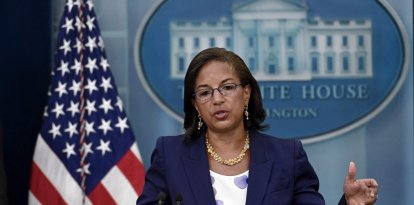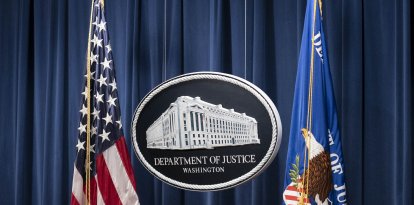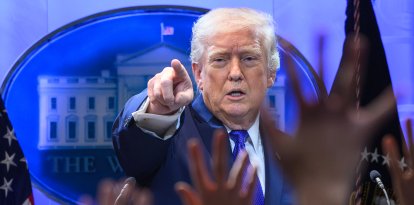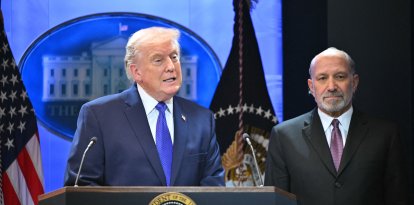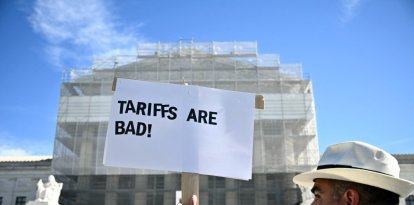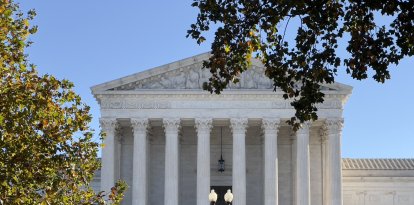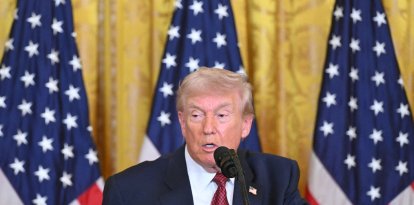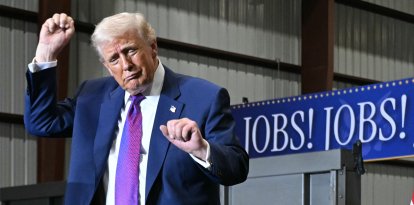Nikki Haley: From having Trump's trust to becoming his nemesis
The former ambassador to the UN became the ideal candidate for Republicans who oppose the former president.

La exembajadora ante la ONU Nikki Haley (AFP)
Donald Trump has put an end to Nikki Haley's famous phrase "I've never lost an election and I'm not going to start now." The former South Carolina governor's minor victories in the Washington DC Republican primary. and Vermont were not enough for the former president's latest rival to remain in the presidential race. Despite her willingness to fight, the conservative voters' overwhelming support for her former friend and now bitter rival led her to call it quits and make way for a 2020 electoral rematch.
Trump's first official rival in the primaries
Haley's campaign has been a true reflection of her character. Rocky, sharp, committed and feisty. She was Donald Trump's first official rival since he announced his candidacy, and from the very beginning, she made it clear that she was not bluffing or trying to use the campaign to increase her popularity in the face of personal challenges. She was running to win. And she did so with the blessing of Trump, the man she had sworn she would not run against. The former president told CNN:
Even then, many analysts didn't consider Haley to be a serious competitor. All eyes were on Trump and Ron DeSantis, who was perceived as the great Republican alternative even though he had not yet commented on a possible candidacy. When other candidates joined in, Haley didn't flinch. Every poll that placed her as fourth or even fifth choice didn't worry her. In fact, she seemed excited by the challenge, saying "underestimate me, that's always fun."
A race overcoming "insurmountable" obstacles
In fact, in the biography on her campaign website, Haley highlights that the struggle to overcome prejudice and difficulties has been an important part of her life. She always - until now - had emerged triumphant. Haley explains that she was born into the only Indian family in Bamberg, South Carolina, in 1972, so she was always an "outsider" in the town. However, she remembers what her mother told her then: "Your job is not to show everyone how you are different ... but how you are the same."
In 2004, Haley ran for the House of Representatives in her home state against the Republican who had held the seat for 30 years. Against all odds, she took the position. Haley points out that her work in Congress did not please the conservative leader in the House, who tried to end her political career.
Far from being intimidated, Haley filed her candidacy for governor of South Carolina. And, again, she won. "In 2010, Haley was elected the 116th governor of South Carolina. She was the youngest governor in the country and the first minority female governor in America," her website states. Among the milestones of her first term, Haley highlights bringing the state's unemployment rate to its lowest level in 15 years and creating new jobs in every county in the state.
In 2014 she was re-elected to the position, and soon after she was listed by Time as one of the 100 most influential people in the world. In 2016, Trump crossed her path and nominated her as U.S. ambassador to the U.N., in addition to including her as a member of his presidential cabinet and on the National Security Council.
Haley's spectacular comeback in the primaries
During the pre-campaign and the campaign, Haley managed to radically turn around the polls and the forecasts. In addition to being behind Trump and DeSantis, candidates like Mike Pence and even the anti-woke businessman Vivek Ramaswamy were above her in the polls.
However, the perception changed little by little until she surpassed DeSantis in January 2024. Each and every one of her rivals, including the governor of Florida, backed out of the campaign until only she and Trump were the last ones standing. Although the distance seemed unbridgeable, she insisted on the need for "a new generation of leadership." She reiterated the need for the former president and Biden to retire. She had the support of a large part of Republicans who oppose the former president, including money from the Koch brothers, but it was not enough.
Not even the painful defeat in her home state of South Carolina made her give up. She even won the nomination in Washington D.C. That gave her the optimism she needed to go into Super Tuesday. Despite winning in Vermont, Trump ended the day with almost 1,000 delegates in his pocket. He only needs a little more than 200 to guarantee his nomination.
Leaving her campaign is bittersweet for the former candidate. On the one hand, she managed to complicate Trump's path to the conservative nomination. She presented herself as a solid and more focused alternative to the former president. However, her perception among the majority GOP voters worsened, and her friendship with Trump was blown up once she was perceived by him as a threat, with compliments like when he famously called her "bird brain."













